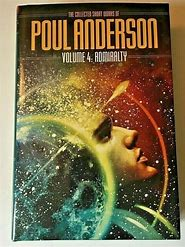"'The universe is too big for any one pattern. No man can understand or control it, let alone a government...
"'If man is going to live throughout the galaxy, he's got to be free to take his own roads, the ones his direct experience shows him are best for his circumstances. And that way, won't the race realize all its potential? Is there any other way we can, than by trying everything out, everywhere?...
"'Let's find how many kinds of society, human and nonhuman, can get along without a policeman's gun pointed at them. I don't think there's any limit...
"'We're laying the foundation of ' - he hunted for words - 'admiralty. Man's, throughout the universe.'"
-Poul Anderson, The Star Fox (London, 1968), CHAPTER TEN, pp. 201-203.
I have had to select in order to quote. Please read or reread the entire novel. There is potential conflict here. If people try everything everywhere, then some of the societies built will be oppressive but they will have to liberate themselves, not rely on "...a policeman's gun..." from outside.
And freedom should always return:
"...a slave is not bred or trained to think for himself. This may be one reason why freedom, unstable, inefficient, stamped to oblivion again and again, still rises new throughout all history."
-Poul Anderson, The Long Way Home (Frogmore, St Albans, Herts, 1975), CHAPTER TWENTY, pp. 178-179.

5 comments:
One should note that recent research has shown that before the State -- that is, before that policeman and his gun that Poul evokes -- violence was the commonest way for an adult human male to die, and somewhat lesser but still significant for females.
That's a cross-cultural constant for pre-State societies, which means you can assume it's a human 'default'.
That is, if you remove the cause of the change (the State and its attempt to claim a monopoly of violence) then things phase-shift back to the default state.
And we're back to taking a spear along to the outhouse because you never know.
For a good look at how that worked, try "Burnt Njal's Saga", which is a poetic record of actual events in the Icelandic Republic, which was more or less a pre-State culture, though an advanced one.
(The original settlers in Iceland mostly left Norway to get away from King Harald Fairhair's consolidation of Norway into one kingdom.)
There's one scene that shows a Viking-era sense of humor. A bunch of feudists have gone to Njal's home to kill him. They can't tell if he's home, so one of them goes down to the house and looks through the smoke-hole in the roof.
He jerks, then gets up and staggers back to the others, clutching at a wound in his chest.
The others ask:
"Is Njal there?"
The man answers:
"I don't know, but his -spear- is."
And drops down dead.
The others look at him for a moment and one says:
"It's one of those new broad-bladed spears. They're very fashionable these days."
That was the whole world, for a long long time.
I think that all or most of the colony planets would have their "state," i.e., their arrangement for internal and external security.
Kaor, Mr. Stirling and Paul!
Both, fallen behind, trying to make a start catching up.
And we see Anderson taking a more nuanced view of this problem in OPERATION CHAOS, where we see Steven Matuchek reflecting that freedom is fine, until goons invade your house to kill, rob, rape, torture, etc., the people you care about. THEN you yourself will give any man on horseback who promises to bring back some predictability into one's life his saber and knout.
THE LONG WAY HOME is one of Anderson's earlier novels, written at a time when he was a bit more optimistic about human beings.
Ad astra! Sean
Sean: if you're not more pessimistic about humanity as you age... well. Mind you, I started out fairly pessimistic!
Kaor, Mr. Stirling!
Sheltered and wimpy tho I was, I never had any illusions about human beings!
Ad astra! Sean
Post a Comment